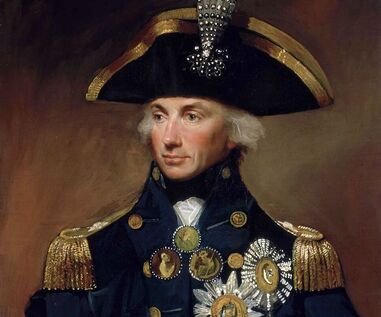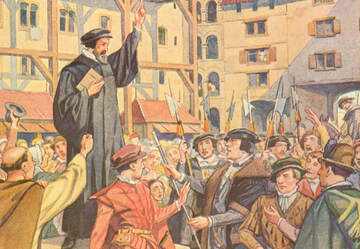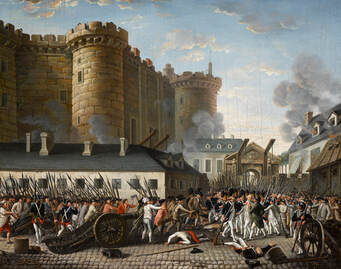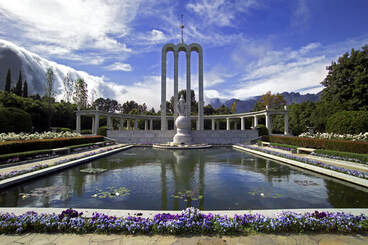 To see a video presentation on this article, click here To see a ScreenCapture presentation on this article, click here To view a PowerPoint presentation on this article, click here. To listen to an audio presentation on this article, click here. The Most Important and Decisive Naval Engagement The Battle of Trafalgar, fought 21 October 1805, was one of the most important and decisive Naval engagements of all time, decisively establishing the supremacy of the Royal Navy on the high seas. Rather than a conventional engagement between lines of battle with gunnery duels, the English made a bold attack that allowed them to gain local superiority over the enemy and raked their ships with devastating broadsides. The Franco-Spanish fleet was decisively defeated and British supremacy on the high seas was decisively established for the rest of the 19th century. Lord Nelson's defeat of the French and Spanish fleets at Trafalgar allowed British trade to flourish around the world, laying the foundations for Britain's emergence as an economic superpower. It also made possible the Greatest Century of Missions, as Protestant missionaries were able to sail to every corner of the world. The Royal Navy's domination of the high seas brought an end to the slave trade in the 19th Century. Britain vs. France The war between Great Britain and France was a clash between a great naval power verses a great land power. In the same year that Emperor Napoleon of France won his greatest land victory at Austerlitz, his plan to invade the British Isles was destroyed by the victory of Lord Nelson at the Battle of Trafalgar, off the coast of Spain.
0 Comments

To Listen to an Audio of this Presentation of this Article, click here
A Man of Action Guillaume Farel (1489-1565) was a dynamic man of action who gave his whole life to spreading the Gospel of Christ. Farel was one of the most important leaders of the French Reformation from its beginnings. By Grace Alone While studying under Professor Jacques Lefevre at Sorbonne University in Paris, Farel came to faith in Christ. Professor Lefevre had published a Latin translation of, and commentary on, The Epistles of St. Paul. As he taught that it is God who saves by grace alone, Farel said his eyes were opened and his heart believed. Leader of the French Reformation When Luther’s Reformation writings came to France, Farel was one of the most prominent leaders in the French Reformed movement. When persecution forced him to flee from France in 1523, he became the leader of a group of evangelists who preached in French speaking Switzerland. Winning Switzerland to Christ Farel’s energetic efforts were central in opposing Catholicism and promoting the Protestant Reformation in Basel, Bern, Lausanne and Geneva. Everywhere he proclaimed the supremacy of the Scriptures and the need to return to a purified faith, which was based on the Bible alone. With great skill in debating and evangelistic zeal, Farel succeeded in winning most of French speaking Switzerland to the Protestant Faith. 
14 July is celebrated in France as Bastille Day. It commemorates the storming of the Bastille and the launch of The French Revolution.
This article can be viewed as a PowerPoint on Slideshare. To hear the audio lecture on The French Revolution, click here. To view the video Presentation click here A Time of Turmoil The French Revolution was one of the most influential events of modern history. The ten-year period from 1789 to 1799 when France went from a Monarchy to a Republic, to a Reign of Terror, to Dictatorship was one of the most tumultuous times in European history. Myth and Reality Much myth and romantic legend has been written on what some politicians would like the French Revolution to have been, but the reality was that the French Revolution was a monstrous horror. In the name of "liberty, equality, fraternity or death!" over 40,000 people lost their heads to the guillotine, 300,000 people were publically executed by firing squads, drownings and other methods of mass murder and ultimately many millions died in the 25 years of war and upheavals that resulted. 
To see this article as a PowerPoint on Slideshare. Click here.
To see this article as a video on Vimeo, click here. To listen to the audio on Sermon Audio, click here. The Huguenots have left us a tremendous legacy of heroic faith, Christian endurance and sacrifice. Their contributions to our culture, spiritual life and prosperity have been out of all proportion to their small numbers. Afrikaans Ancestors There are many Huguenot surnames amongst us to this day: Blignaut, De Klerk, De Villiers, Du Preez, Du Toit, Fourie, Hugo, Joubert, Le Roux, Malan, Nel, Pienaar, Retief, Rossouw, Theron, Viljoen, Visagie, and many others. The first Huguenot to arrive at the Cape, on 6 April 1652, was Maria de la Quellerie, the wife of the first governor of the Cape, Jan Van Riebeeck. Maria's grandfather had been a French Huguenot pastor. Dynamic Christian Movement The Huguenots were Protestants, members of the Reformed Church of France. Their forerunners were the Waldensians, a dynamic Bible study movement which arose in the 12th century, led by Peter Waldo, a merchant of Lyons. The Waldensians desired to study the Scriptures and be faithful to Biblical principles in all areas of life. These poor men of Lyons went out in twos and boldly proclaimed the Word of God throughout Southern France, Northern Italy and Switzerland. |
Categories
All
Archives
October 2022
|
 RSS Feed
RSS Feed